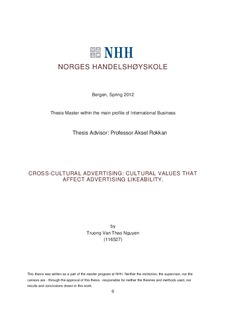| dc.description.abstract | This paper attempts to investigate the cultural values that have influences on consumers’
advertising likeability. Three groups of nationalities were assessed, including: Singaporean
Chinese, Chinese from China, and Westerners. Advertising likeability was examined from
two aspects: liking of culturally congruent advertisements and liking of humorous
advertisements with sexual content. In the analysis of the impact of cultural elements,
individual-level factors that have potential moderating effects were taken into account. These
consist of the need for cognition (NFC), need for humor (NFH), and cosmopolitanism (COS).
The findings from this study have shown the effects of ad-culture congruency. In other words,
cultural differences along Hofstede’s dimension of collectivism and individualism have
effects on consumers’ preferences towards ad appeals. Subjects tend to show preferences for
the ad appeal that is conforming to their cultural orientations. Specifically, Singaporean
Chinese favor collectivistic themes, while their Western counterparts prefer individualistic
themes. The moderating effect of Product type was not proved to be significant in this study.
That is to say, whether the product is personal or non-personal, ad-culture congruency is
beneficial. Besides, the level of cosmopolitanism did not appear to affect the liking of
culturally congruent ads.
With regards to humorous advertisements with sexual content, results from this study suggest
that Singaporean Chinese favor those ads less than Westerners but more than Chinese from
China. Being well-known as modern and open-minded, Singaporean Chinese are still
conservative towards sexuality contents in humorous ads. This liking is moderated by the
individual level of cosmopolitanism (COS) and need for humor (NFH). Specifically, people
who are highly cosmopolitan and have higher need for humor shown greater liking for
sexually humorous advertisements.
Finally, the study looks at the role of advertising liking in advertising effectiveness. Findings
have shown that liking of the ad leads to better attitudes towards the brand and purchase
intention. This effect, however, is moderated by individual need for cognition (NFC). | no_NO |
